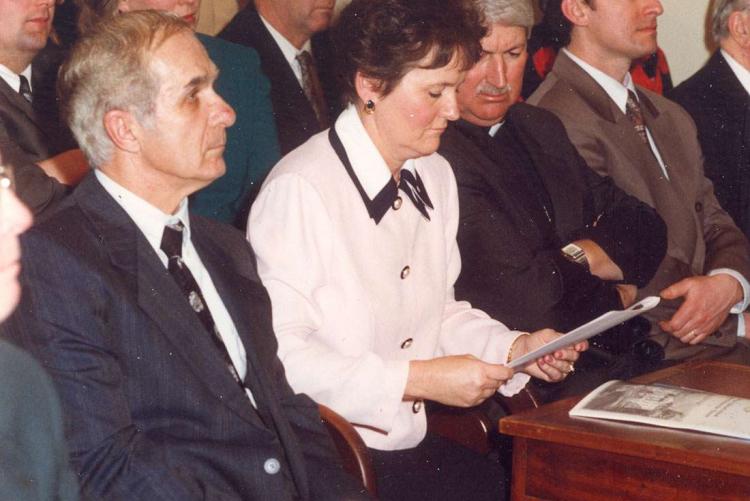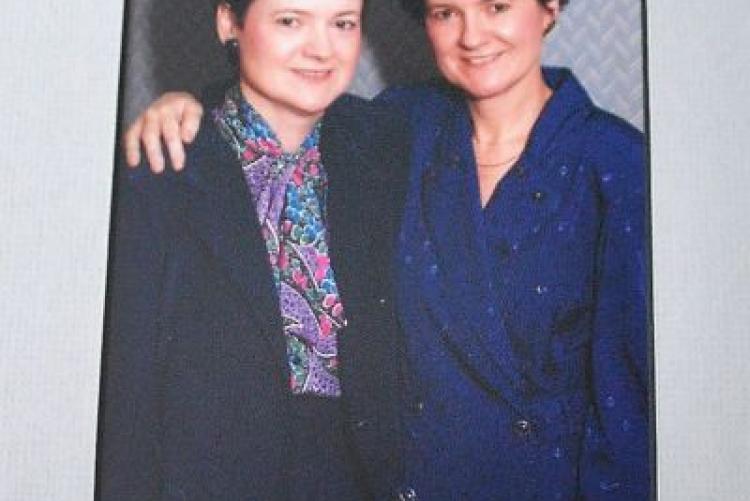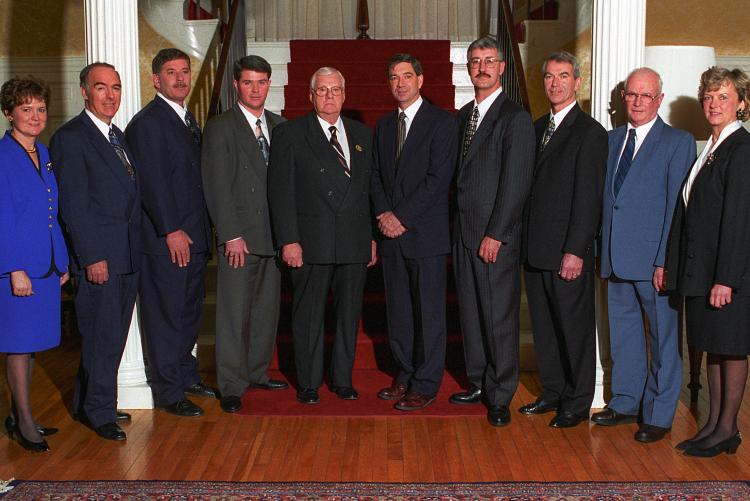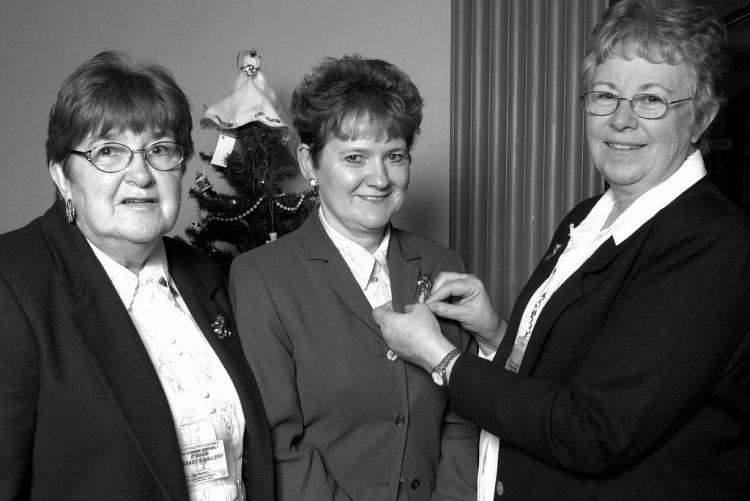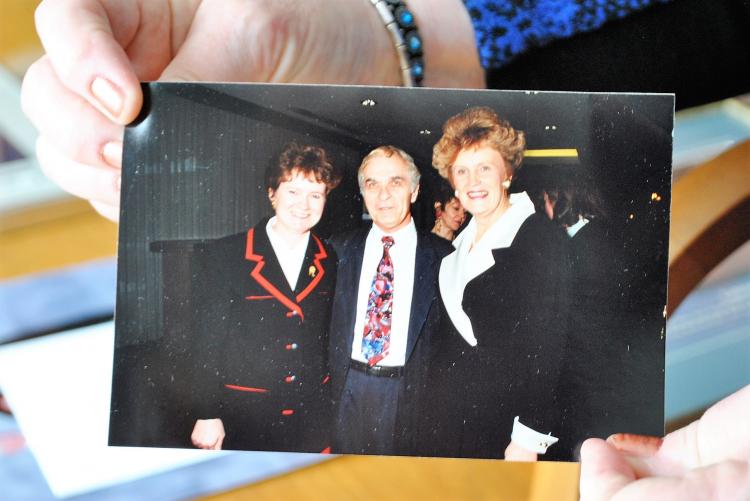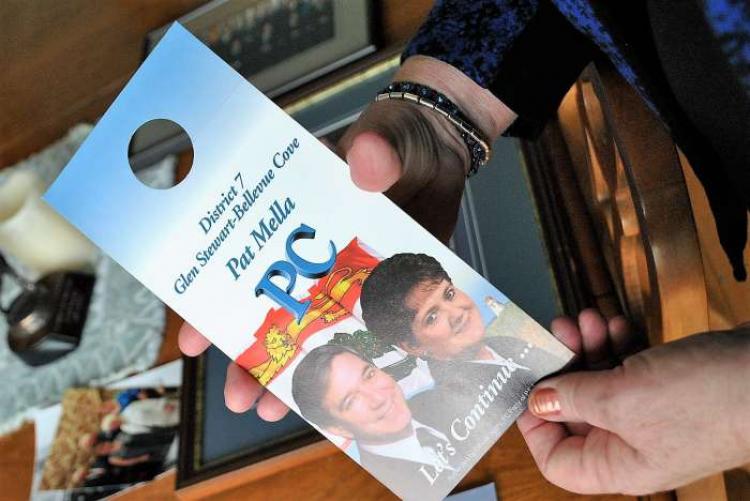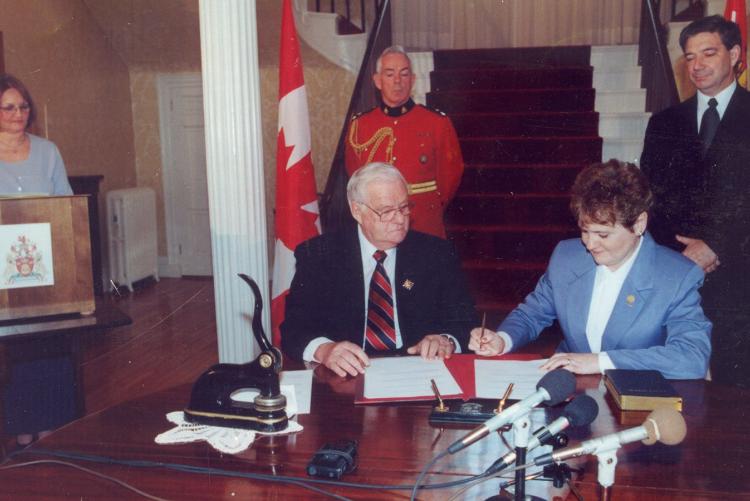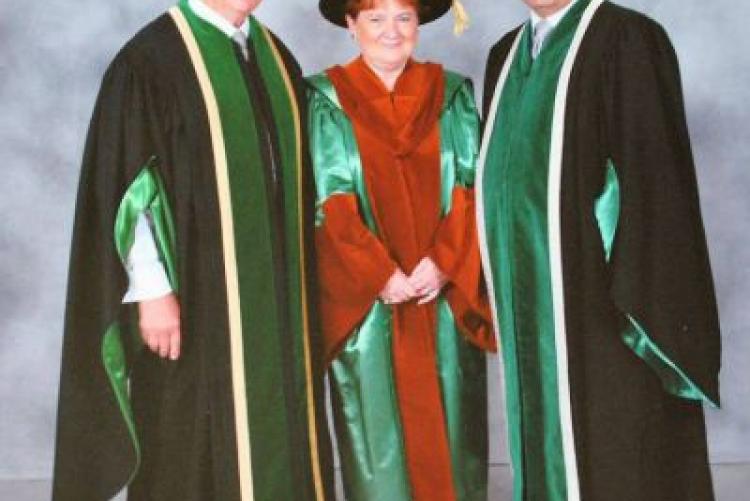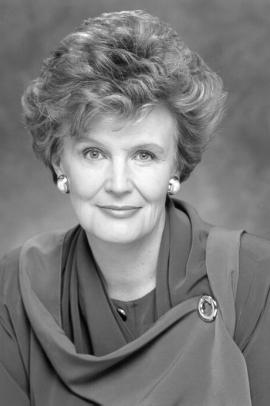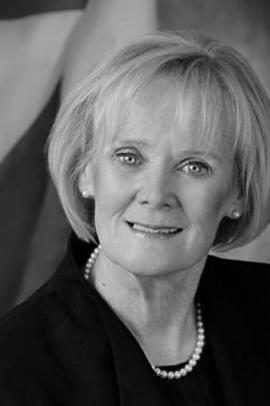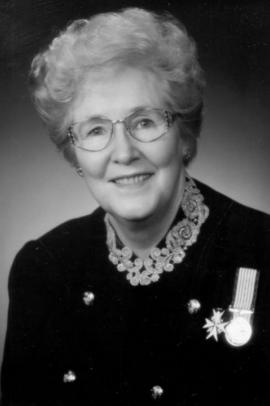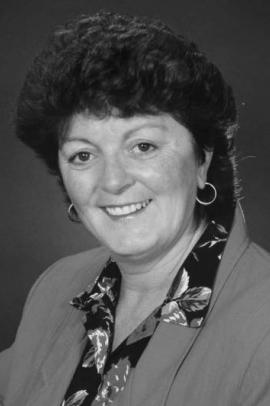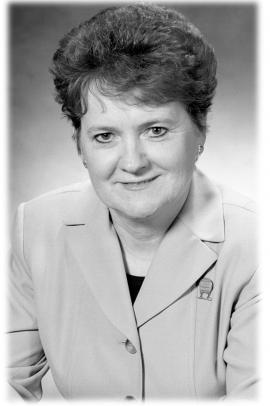Fearless. Steadfast. Opinionated. Passionate. Intelligent. Thoughtful. Compassionate. Feisty.
They are words that easily describe the fiery Mella.
When she saw a need for change, Pat Mella immediately stepped up.
She never waited for an invitation to lead. She never asked permission. Mella was never one to wait for opportunity to present itself, particularly when it came to politics.
“My experience of studying sociology and social change and having lived in Washington and Ottawa showed me how a society advances,” said the retired politician. “You try to initiate better public policy and make sure you are representing what people want.
“I think it was Angus MacLean who said a government that will give you everything you want is a government that will take everything you’ve got,” she added. “It is fine to ask for things, but if you ask me for something and I decide to give it to you, I am probably going to take something from somebody else.“
“The voice of the people who have things taken from them is not as strong. I did notice that conspicuously when I was in government.
“The people that needed the least help were the most vocal. That is what much of the issue is with the working poor -- not only the working poor but also the middle class. It is hard to get their voice heard because there are so many larger voices with the means to be heard.”
At times during her political journey -- which spanned more than two decades -- Mella was the lone voice of Opposition and, at times, the lone voice tasked to keep the government of the day accountable.
A strong woman on her own in the historic Legislative Assembly of Prince Edward Island against 31 Liberal members in the sitting government, she was the first woman elected to lead the Opposition and the first woman to lead the Progressive Conservative Party – or any political party – in Prince Edward Island.
THE EARLY LIFE OF PAT MACDOUGALL
It was a long way from her days growing up in an Irish Catholic home in Bloomfield, PEI.
She was born on Aug. 29, 1943, to Frank Joseph and Patricia Mary Hilda (nee Callaghan) MacDougall.
The importance of education was central in Mella’s upbringing in rural Prince Edward Island. All of the MacDougall siblings – oldest brother, Don, a well-respected entrepreneur; Peter, who, in the years before his passing quietly helped many people; Frances, a Notre Dame sister; Mella and her sister Peggy, a palliative care nurse; and youngest sibling, Philip, a chartered accountant and public servant – each went on to earn a university degree.
It was something that was non-negotiable with her mother, who she describes as a “typical Irish mother”, a well-respected and well-educated woman in her own right. A teacher who stepped away from the classroom to raise her family, the MacDougall family matriarch was adamant that her children continue their education.
“She pretty well said to us ‘you are going to university, all of you, some way you are going to’. It was kind of assumed that once you finished high school you were going to university,” recalled Mella. “It was kind of unique in that sense.”
Her mother returned to teaching when Mella and her twin entered high school. At that time, the family had moved to Kinkora from Bloomfield where Mella’s father had been a CNR agent.
EARLY MEMORIES OF POLITICS
Although there was little discussion about politics at home, Mella recalled being a child sitting in the parlour with her parents on an election day and the feeling that something important was happening.
“There would be pencils and papers and copying down what votes came in,” recalled Mella of election days in the MacDougall household. “There was a representative at the time he was called the Great West Wind, Mr. (Robert) Campbell, from the Alberton area. He was the ultimate politician. Everybody went to him for everything.”
Although politics was present in the MacDougall household, the topic was not prevalent in the home and political leanings were rarely debated.
“We kind of paid attention to politics, although – and I am not sure – most of my relatives in the west I would think today are Liberals. As a matter of fact, I know quite a few of them are,” Mella said with a laugh.
Mella said that her early upbringing likely did not contribute to her decision later in life to enter into the political arena.
That idea was likely first born, but not nurtured, until years later when she attended St. Dunstan’s University and decided to major in sociology.
LEAVING HOME AND THE DESIRE FOR SOCIAL CHANGE
Thanks to a fellowship, Mella continued on to graduate school at the Catholic University of America in Washington DC, borrowing $500 from her Aunt Della to make the journey.
There she rubbed shoulders with some key movers and shakers.
“Washington was the ultimate place, especially with the assassination of President Kennedy. I remember going over to the graveyard where Kennedy was buried and Jackie Kennedy was there. I used to get invited to the State Department because I was Canadian,” she recalled. “I met quite a few people like Dean Rusk, who was the Secretary of State, and Robert and Ethel Kennedy, quite a few people like that.”
It was during this time that Mella’s desire for social change and real love of politics flourished.
With her medical sociology degree in hand Mella made her way north after landing a job in the sociology department of Ottawa’s St. Patrick’s College where she became a faculty member.
It was at St. Patrick’s College where she met her husband, Angelo Mella.
PAT THE PROTESTOR
During her three years in the nation’s capital Mella immersed herself in politics, setting the stage for a career in the field that followed years later.
Teaching sociology at the university level in one of Canada’s largest cities and the hub of democracy in this country in the late 1960s and early ’70s was an interesting experience for the young woman from rural Prince Edward Island.
“Some of the students were kind of all set to protest anything and others just wanted to get their diploma and get out of there.”
Mella joined one of those protests, storming Parliament Hill in a dramatic display against Apartheid, a system of segregation and discrimination prevalent, at that time, for decades in South Africa.
“We decided we would create coffins. We built coffins and we wrapped them in black, painted some of them and some of them were in black clothes, and we marched up Parliament Hill with all of these coffins to try to remind the politicians in Ottawa that they, too, should speak out against apartheid in South Africa.”
MOVING EAST – AND BACK TO PEI
Eventually, the Mellas made their way east, first moving to Halifax, N.S., after Angelo landed a job in his field of mathematics and computer science. They would have three children – Andrew, Michael and Nancy.
The red soil called Mella home, prompting her to apply for and land a teaching position.
Over the next several years she focused on teaching, first landing a position at Birchwood Intermediate then Queen Charlotte Junior High and onto Colonel Grey and Charlottetown Rural.
THE PATH TO PEI POLITICS
Fast forward to 1984.
One person and the buzz that surrounded him would draw Mella into a world that would be a significant part of her life for the two decades that followed. That person was Pat Binns.
“At the time he was running as an MP. I had been following the political stories and I kind of paid attention to Pat Binns and thought, ‘oh, here is a guy who is young and well spoken.’ His background was community leadership and I thought ‘this is the kind of person that would be good in politics. I think I could like this guy.’”
Mella got in her car and headed east to the federal riding of Cardigan, signing up to volunteer with the campaign.
“Of course, they willingly took me on and I did volunteer work. It was ironic, because I didn’t know that he would be my Premier at the end of the day.”
Binns became the MP for Cardigan and Mella would remain involved behind the scenes with the Progressive Conservative Party of Prince Edward Island.
A few years passed and the party was positioning itself for the provincial election that would close out the 1980s.
Mella decided she would seek the nomination for her party in the district of 3rd Queens in which she lived, making her intentions known to the party executive.
“They said, ‘oh, that’s great, that’s terrific, so you will be running against Tom Dunphy.’ Tom Dunphy lived in York. It was all Third Queens and it was a larger district. I said ‘no, Betty Jean Brown lives near me. I will run against her,” she said, recalling the conversation. “They said, ‘no’, and I said ‘why not?’”
The reason was one that had been prevalent in the history of politics on PEI and in the fabric of life of Canada's smallest province up until that point, and that was religion.
“They said, ‘aren’t you Catholic?’ and I said yes. Well, they said, ‘Tom Dunphy is Catholic and the Catholic runs against the Catholic’.”
Although there was a historical reason for this policy, Mella was shocked that it still existed. It would be something that would later prompt her to take on a leadership role in ensuring there was change made to what she felt was an absurd rule.
Mella forged ahead, secured the nomination and hit the campaign trail. She admitted that, in her day, the nomination was the biggest hurdle to overcome in the political process for any candidate – particularly for women.
“The parties had total control and there was no membership vote at all,” she said of the process at that time. “Now at least you have a list of the membership and you have access to the membership and you know who is going to be voting. That’s a big step forward, of course, to have the members voting.”
The nomination process today still varies depending on the party, but the process for each party must be clear so that any potential candidate – no matter their gender – can receive fair and equitable treatment, Mella asserted.
“There are still a lot of backroom allegiances and, you know, subtle support. It is still difficult to get to the point where your name is on the ballot. It is still quite difficult,” said Mella. “Apart from the family issues like child-care, it is difficult to get people to admit that they would be better off if they had more diversity in the organization.
“It’s hard to believe we have to convince anybody of that, but it is true.”
PAT THE PARTY LEADER
Mella was not successful in her first attempt to win a seat in the Legislative Assembly of Prince Edward Island.
She set her sights on another position, that of Progressive Conservative Party leader, and won the three-candidate race to become the first woman elected to lead a political party on Prince Edward Island.
Mella secured 473 delegate votes while Barry Clark had 382 and Roger Whittaker, 32.
The next election would be a tough one to win, as the Liberals were wildly popular.
Life became a delicate balancing act for Mella, with her duties as leader of the party, wife and mother and the task of campaigning to win a seat in the Legislative Assembly of Prince Edward Island and guide her party to victory in the 1993 election.
A fire at the Mella home in Stratford in the middle of the campaign displaced the family, but that did not deter the family's matriarch, who was determined not to let the setback stand in her goal of getting elected.
The outcome of the 1993 election saw Mella, who was elected as MLA for 3rd Queens, as the only member of her party in the 32-seat Legislative Assembly of Prince Edward Island.
THE LONE VOICE OF OPPOSITION
As the lone voice of Opposition, Mella was a formidable foe.
“It was a very unique experience because the 31 Liberals… they realized that I was not too nervous about this whole set up,” she said with pride.
Mella, as many women in politics do, became a master juggler and developed a thick skin. Despite being in Opposition and the person tasked to question their every move and decision, the governing members respected the Progressive Conservative MLA, something Mella appreciated.
“They were so comfortable in not making me it upset. It was very, very interesting.”
She admitted, though, that the job of being the party leader, the lone MLA from her party and the Leader of the Opposition in the House was at times daunting. It was her job to get the answers that Islanders wanted, to uncover details behind the decisions government was making and to ensure that the message was getting to the public via the media.
“It was very difficult do to everything that needed to be done. While in Opposition you still have to make sure that the party is comfortable with what you are asking, with what you are doing and where you are going and all those kinds of things,” said Mella.
“I tried to be superwoman. I tried to be home, get supper and take the kids to whatever sports they were in and that kind of thing. I had to do a lot of travelling across the province, and that was difficult.”
Improving her province was key to her making one of the most difficult decisions of her political career. Mella knew that in order to affect change as a politician being in government was paramount
Mella had proven herself as a force to be reckoned with and a worthy adversary to the governing Liberals, but there was the question whether she could lead the Progressive Conservatives to victory in the next provincial election.
She delved into some of the reasoning behind her decision to step down as leader and hand over the party’s reigns to Pat Binns, who would go on to serve three terms as premier of Prince Edward Island.
“What happened is that the polls had more influence than they do now. They were showing that the party was at 23 per cent, or whatever, and that the party was not improving. There was a good chance to beat the Liberals because they had some initiatives that were unpopular,” recalled Mella.
“The party people came to me and said ‘we are going to watch for a little while and see if they change’. They didn’t.”
Mella resigned herself to the fact that she would not become premier, and stepped down as party leader.
“I thought he would be a good premier. I ended up thinking, OK, I want to be in government,” she said. “At that point I had been critical of everything. It is easy to be critical but it is not so easy to bring about change. There is no point in complaining, you have to do things.”
Looking back, is it a decision that Mella regrets?
“I don’t know whether it would be a regret at this point. I think it would have been the most stressful for me. I knew it was a bad signal for women. I knew I had worked as hard as anybody else would have in the position I was in, but, at the same time, I had to be realistic and say, OK, maybe you will end up in Opposition again or do you want to give somebody else who might be able to change the voters’ minds a chance.”
CABINET AND BALANCING THE BOOKS
Mella would reach cabinet when, in the Nov. 18, 1996, the Progressive Conservative Party of Prince Edward Island under the leadership of Binns formed government.
The PCs went from Mella's one seat to 18 members elected to the new 27-seat Legislative Assembly of Prince Edward Island.
With so many new faces around the table, Mella became the veteran member for the governing party, a person instrumental in guiding her fellow PC MLAs in the years to come.
“I had all the experience and they didn’t have any. I thought I know what I am doing,” she recalled. “It is interesting because a lot of the members were new and they were going through what I had gone through earlier. I felt very comfortable and then I ended up with the Finance portfolio.”
Finance, also known as the Provincial Treasurer, is one of the toughest portfolios to hold in government. Hard decisions about the province’s spending and fiscal management fall on the shoulders of the department’s minister and its staff.
At the time, Mella felt it was not necessarily a “we love you” appointment, as she knew there would be a challenging balancing act that would come with the demanding job.
"It is fine to ask for things but if you ask me for something and I decide to give it to you I am probably going to take something from somebody else. The voice of the people who have things taken from them is not as strong,” she added. “I did notice that conspicuously when I was in government. The people that needed the least help were the most vocal."
“You know, that’s what much of the issue is with the working poor, not only the working poor but the lower middle class – it is hard to get their voice heard because there are so many larger voices with the means to be heard.”
She recalled sage advice she received from a wise and trusted member of cabinet, Wes MacAleer.
“God love him, what a great guy he is. He said, ‘Pat, something I want to remind you of is that all these ministers that are here we are all together in the same party and we are all trying to improve PEI I just want to give you a heads up that each minister is going to try to get as much money as they can for their department. They are not going to worry whether you are going to go into debt. You are the one that is going to decide whether or not they do, so just be aware of that’,” she said, recalling that important conversation.
“Of course, he was right. I didn’t mind the job of saying no. I didn’t say no unless I absolutely knew this was not going to be affordable or this was not the right way to be going.”
ONE OF THE PEI FAMOUS 5
Mella sat in the legislature at a time when there were more women MLAs than ever before – or since.
As Leader of the Opposition -- and of her party -- she would become part of history and sit for a photo that has come to represent a significant milestone for women in politics in Prince Edward Island.
The year was 1993. Women held the five positions of political power, which was a first in the province and the country.
Mella is one of PEI’s Famous 5.
“The sad part is that although we had those 25 years ago, it looks like we went backwards since,” she said.
“It is a bit of a tribute to Islanders that, back then, they weren’t directly opposed to having women take on these jobs. I think that says a lot about Islanders in that sense. And, I guess, these initiatives can slip away unless people keep them on the front burner and make sure this regression doesn’t happen.”
At the time there were eight women sitting in the provincial legislature.
The numbers have since dwindled. Mella hopes that in future elections there will be more women on the ballot.
“Political parties need to put together a very good program and explain everything. People assume candidates know how you get a nomination, that everyone knows you get people to go and support you, everyone knows what a district is. That is not really true,” she said. “I would love to talk to a woman and convince her to run because, I shouldn’t probably say this, they couldn’t do any worse. It is a very positive experience.”
ADVICE FOR FUTURE POLITICIANS
Is there advice she would pass along to women thinking about running?
“We need to familiarize women with what this is all about,” said Mella. “It is possible to do. It is very satisfying. People that want to be comfortable that they have done their part to improve their province, I think there is probably nothing more important.”
The job of serving the public in the role as a member of the legislature is not for the faint of heart. It is a lot of work: countless hours spent on the roads in the district and across the province; meetings with and phone calls from constituents; funerals, wakes, birthday parties and anniversaries to attend; meetings with local councils, concerned service groups, endless chats at the coffee shop and at the grocery store; and simply staying in touch with the electorate. That is in addition to constituency office hours, time in the legislature, and, if appointed to cabinet, the work of your department’
“It is probably one of the most misunderstood parts of politics. It is a 24-hour job,” said Mella. “When you are not physically going, it is in your head what you should be doing. It is a lot of work, a ton of work.”
LEAVING POLITICS BEHIND – PERSPECTIVE
Mella resigned from political life prior to the 2003 election, opting not to reoffer in that year's provincial election.
“I am comfortable that I made my own decision. No one asked me to or anything, I made it totally on my own.”
Mella believes there are many women leaders across Prince Edward Island who could sit where she has.
“There are a lot of women that would be good in government that opt for something else, getting involved in their kid’s ringette program or hockey, services clubs or community groups.”
These women could help improve the lives of their family, friends and neighbours – and PEI, asserted Mella.
“The biggest change you can make is being in government. That is where the action is and you can make a big difference in people’s lives, really. That is kind of an intimidating thought, but it is true.”
Regret is something that Mella has very little of when it comes to her political career. If given the chance, she would easily do it all over again.
“Absolutely.”

